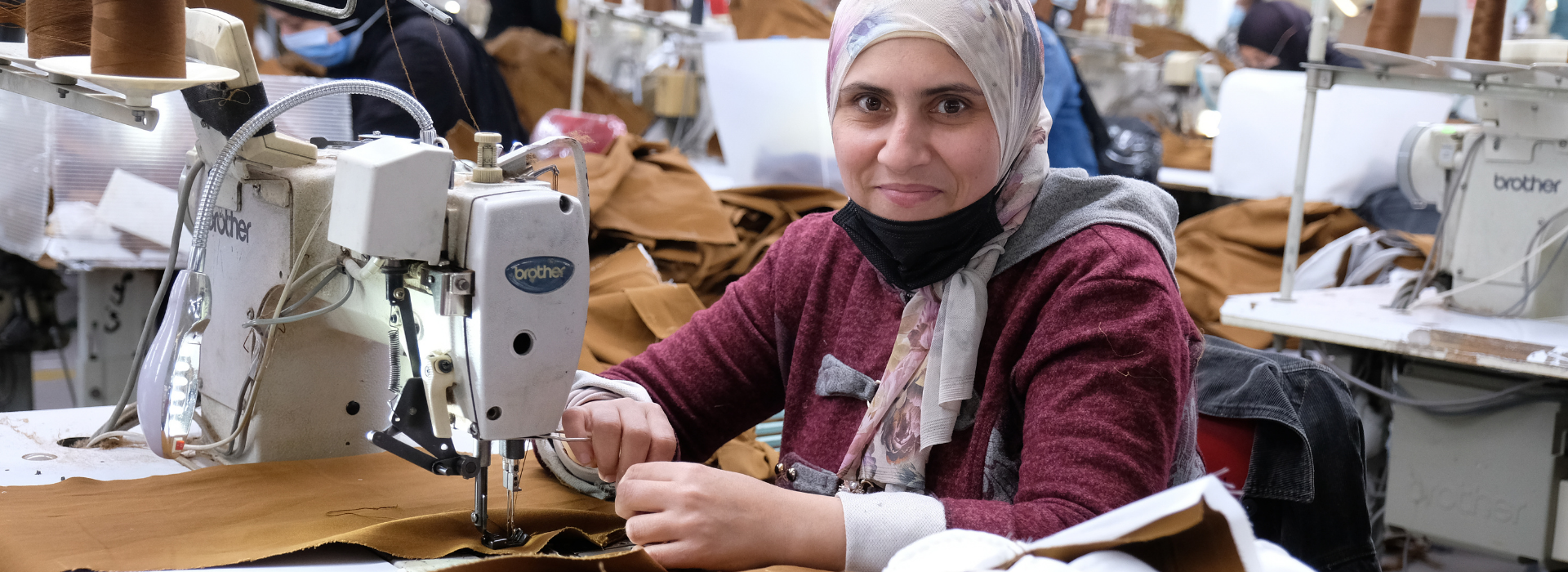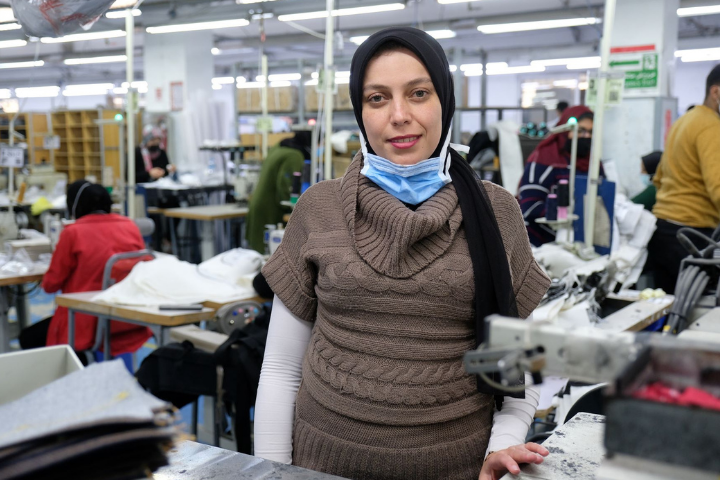In Egypt, digital payroll helps garment workers reap what they sew
June 27, 2022 | By Laura Macias
Port Said, at the northern tip of the Suez Canal, is uniquely attractive to national and international fashion brands due to its direct shipping connections, its free zone and easy access to so-called “white gold” — superior Egyptian cotton, one of the finest natural fibers in the world. After “black gold” — oil — and actual gold, textiles and apparel are among Egypt’s top exports, and the sector employs more than 1.5 million workers, half of which are women.
In a country with strict gender norms and roles, where men tend to be seen as the breadwinners and women as the main caregivers, this sector offers a unique opportunity for women’s economic empowerment.
Most workers in this industry still receive their wages in cash. It can lead to unfortunate consequences for all parties: Paying employees in cash is risky for factories — it requires them to transport large amounts of money. Another danger for women: They are also more at risk of being robbed than men. Female workers usually have limited control over their salaries and family members might have easy access to their cash. Additionally, workers stand in long lines to receive their wages, which cuts down on productivity and personal time.
BSR, a global sustainability organization, partnered with Mastercard, Levi Strauss & Co., Commercial International Bank and the Center for Development Services in 2019 to pilot our HERfinance Digital Wages initiative with workers at Lotus Garments Group, a Levi’s manufacturer in Port Said. Bringing the benefits of the digital economy to cash-dependent workers, the initiative helps managers digitize their payroll while ensuring the specific needs of female workers are considered.
Nearly three years later, 9,310 workers at Lotus were being paid digitally into financial accounts — that’s nearly 90% of the factory workforce. Now the initiative is expanding with the aim of supporting nine more factories supplying global brands, including M&S, Kontoor, PVH and The Children’s Place. The goal is to reach 20,000 workers in total.

Marwa, a worker at the Lotus factory, says the training she received as part of the digital wages program helped her save and budget better during the COVID-19 crisis. (Photo credit: M. Moawad/BSR/CDS)
Building financial capability for workers, especially women, is a vital part of digital payroll services. With support from the Mastercard Center for Inclusive Growth, participants in the Digital Wages program receive gender-sensitive training, including technical guidance using their new payroll accounts and associated financial services. They also learn lessons on financial planning, budgeting, savings and discussing finances with their families. The program is designed to help workers manage and control their money, building independence and resilience in the process.
The training especially addresses women workers' needs, acknowledging the discriminatory situations they might face at the workplace and the different challenges they encounter when accessing digital financial services.
“At the beginning, I knew only how to withdraw the money from an ATM, and I used my bank account in the same way as a cash envelope,” says Amal Fahmy, one of the Digital Wages peer educators at Lotus Garments. “Once my salary was put on my account, I withdrew all my money. After the training sessions, I learned about the many services offered by my payroll account and other financial skills. Now I save part of my salary in my account and withdraw only the needed amount of money.”
Digital accounts were also a critical asset during the COVID-19 lockdowns, as many facilities closed and workers receiving payments in cash faced long delays in their salaries. In contrast, most workers with a bank account received payment on time. The knowledge workers gained from the training sessions also helped them cope with uncertainty and foster resilience: “I’ve been using what I learned to follow up on my expenses and build a budget,” says Marwa, 29, a female garment worker. “I think this knowledge on saving and financial planning was especially useful during the COVID-19 crisis.”
After digitizing wages and participation in the HERfinance Digital Wages program, Lotus reported a 42% reduction in time spent on payroll, and 96% of workers interviewed reported that they prefer to be paid in a bank account, rising from 25% at the start of the program. Four in 10 women surveyed reported saving every month after the program implementation.
“One of the barriers to digitizing wages was the lack of opportunity for workers to cash out wages on payday,” says Tamer El-Dessouki, sustainability manager at Lotus Garments. With only one ATM near the factory, the company arranged for a mobile ATM to be on-site for payday and the days following. Managers staggered workers’ breaks to reduce demand for the ATM and factory transport buses stopped at other ATMs on the way home. “The next step is to encourage workers to use more financial services, which will reduce their need to cash out on payday,” El-Dessouki says.
The partnership also developed technology tools to facilitate the transition to digital wages at scale. Together with Quizrr, the initiative developed a technology learning tool for workers based on the HERfinance Digital Wages program and training curriculum. The tablet-based training tool uses engaging films, quizzes and animation to support workers in increasing their knowledge of financial services, improving financial health and building their digital literacy. Peer educators said the tech tool makes the session more enjoyable and entertaining, and they related to the characters and situations that are used to explain the core concepts.
The collaboration also created a HERfinance Digital Wages Tech Toolkit for Managers, which sets out best practices and guidance for garment managers to transition toward digital payroll in a responsible and efficient manner.
The Egypt Digital Wages partnership has shown that digitizing wages, accompanied by financial capability training, can lead to increased financial inclusion and resilience for female garment workers. Mastercard and HERproject will continue to work together to build the business case for wage digitization and support the scale-up by sharing best practices, insights and digital training tools with key stakeholders, including employers, buyers and financial service providers.
By sharing digital tools and training, we can improve the long-term financial health of women and, in turn, make the communities in which they live — and the supply chains on which we all depend — stronger and more resilient.
Amany Shalaby, program specialist and HERproject Egypt coordinator for the Center for Development Services, and Ella Moffat, HERfinance manager for BSR, contributed to this story.